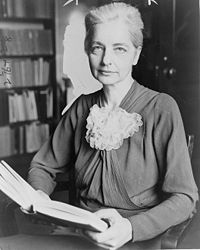
According to Ruth Benedict, her ideas primarily focused on the relationship between the individual and the society. After reading Nietzsche’s Thus Spoke Zarathustra, which was largely based on the philosopher Zoroaster, she felt a sense of freedom from a highly restrictive past. The book allowed Nietzsche to revolt against conformity. A highly unusual representation considering Zoroastrianism was the supposed precursor to Christianity and was formatted in such a way that reflected a strict doctrine of living a pious life. So where’s the argument? The agenda and the approach to Native culture is the issue I have with Benedict.
If Ruth Benedict used Zoroastrianism as a basis for comparison for the Zuni, as an example, she can hardly access the cosmological structure, which existed in the minds of the Zuni people. Furthermore, this structure formed the basic division in the village and social organization.
Benedict used library research as the foundation for the village, personalities, and ritualistic acts of the Zuni and the Dobu. In my opinion, there is no possible way to understand the core values of a culture unless you can truly observe them. Although Benedict was versed in some values of the tribes prior to working with them, she had that knowledge because of textual resources, not firsthand accounts.

The Zuni and Dobu each have tribal distinctions and social roles, which can be described in temporal and spatial terms according to place. We observe Margaret Mead taking this approach in the mountain community of Bajoeng Gede. Whereas Mead observes societal existence in “time, space, and status”, Benedict strays from this psychological approach to behavior in communities. Furthermore, Benedict lacks a collection of data for comparison and an understanding of dynamics between “the individual and cultural ethos”.
Benedict does state, “We may know all about the distribution of a tribe’s form of marriage, ritual dances, and puberty initiations and yet understand nothing of the culture as a whole”. Using the Apollonian term to describe the tribes which ascribe to the cosmos would have made perfect sense for further research, after all, the basis for the gods in Greece and the cosmologic order of the Zuni tribe, have more in common than people think. Then, the term Dionysian is thrown into the mix to describe violence as a valued custom in certain tribes, even when used in the context of a transcendent ritual. Both terms are psychologically based, and the fact that Benedict barely touched the surface of deep rooted behaviors, makes me wonder why the terms are used in Benedict's research in the first place.
Ruth Benedict did come to terms with tribal core values considering the actual research completed. She understood that not all individuals could “fit into the accepted patterns of cultural life”, including herself. Yet in order to truly comprehend the core values of a tribe, one must understand the origin of those values, and there lies the flaw in Benedict’s research.
Picture Sources
The Pueblo of Zuni







0 Comments:
Post a Comment
We appreciate comments, but we delete SPAM.